- Revenue Cycle Management
- COVID-19
- Reimbursement
- Diabetes Awareness Month
- Risk Management
- Patient Retention
- Staffing
- Medical Economics® 100th Anniversary
- Coding and documentation
- Business of Endocrinology
- Telehealth
- Physicians Financial News
- Cybersecurity
- Cardiovascular Clinical Consult
- Locum Tenens, brought to you by LocumLife®
- Weight Management
- Business of Women's Health
- Practice Efficiency
- Finance and Wealth
- EHRs
- Remote Patient Monitoring
- Sponsored Webinars
- Medical Technology
- Billing and collections
- Acute Pain Management
- Exclusive Content
- Value-based Care
- Business of Pediatrics
- Concierge Medicine 2.0 by Castle Connolly Private Health Partners
- Practice Growth
- Concierge Medicine
- Business of Cardiology
- Implementing the Topcon Ocular Telehealth Platform
- Malpractice
- Influenza
- Sexual Health
- Chronic Conditions
- Technology
- Legal and Policy
- Money
- Opinion
- Vaccines
- Practice Management
- Patient Relations
- Careers
Keeping Patients Healthy Outside the Office
One of the great promises of health technology is the ability to monitor patients' status outside of the office.
This article was originally published by iMedicalApps.
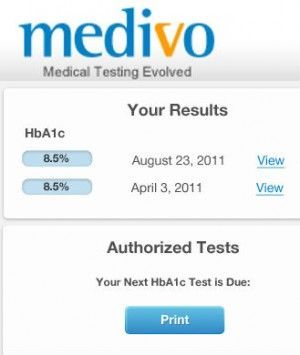
One of the great promises of health technology is the ability to monitor patients’ status outside of the office.
With a shortage of primary care physicians, it is vital that we find lean ways to scale quality health care across large patient populations.
Medivo is building a sophisticated patient panel management toolset that is a significant step towards this goal.
According Chief Executive Officer Sundeep Bhan, Medivo started with labs because 60% to 70% of all new diagnoses require labs, with 700 million lab-related transactions happening yearly.
“It was an obvious initial proof of concept for the platform,” he said. “Many of us around during the last health tech boom learned the hard way to tackle focused problems first, which is difficult sometimes given the number of huge problems staring you in the face in health care”.
Co-founder Bhan recently made news by being selected as one of “10 health care transformers” by Startup Health, the New York-based academy of health and wellness innovators.
Their initial offering tracks relevant labs of diabetic patient panels, (including HbA1c, LDL, HDL, triglycerides and microalbumin) and provides both discrete results and trends through monthly summaries and a dynamic provider portal. Notably, “PatientPath” does not interfere with the practice’s existing system for otherwise receiving lab results, and does not require an electronic medical record (EMR) for use. They have integrated with over 4,000 local lab centers across the United States and strive to make the initiation process as simple as possible.
Medivo’s data display interface is significantly more intuitive and colorful than other common panel management products, not to mention EMRs. With a glance, clinics can identify which patients are not at goal values and which are trending in an undesirable direction. Providers also receive alerts through their provider portal if patients are due for a lab test.
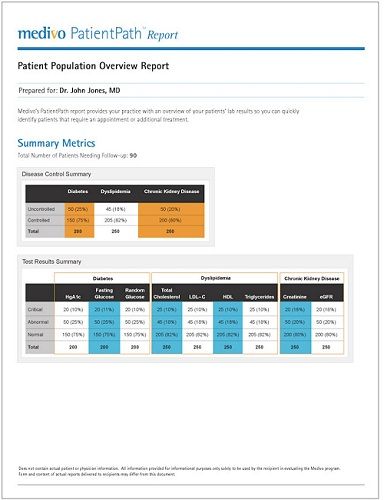
A more detailed view of lab results is also available as a “Summary Report.”
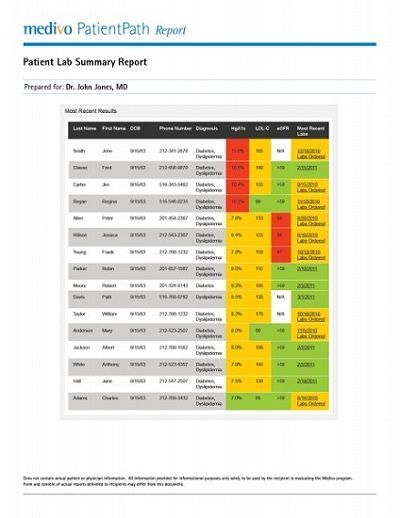
While not required to use PatientPath, the patient facing “Medivo Monitor” is the real differentiating feature of the product. Patients have access to their own secure portal where they enter basic health information and can then view their labs and historical trends, and receive personalized health education and alerts when they are due for an office visit or lab test. Importantly, invitations to join Medivo Monitor come from the patient’s medical provider, reinforcing the provider-patient relationship.
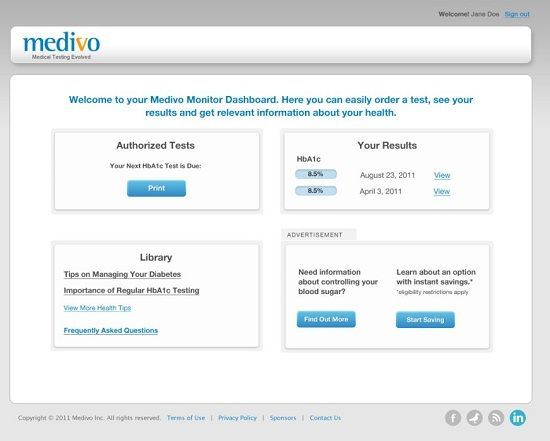
Most interestingly, patients also have access to a suite of Medivo mobile applications that support management of their chronic disease and symptom tracking. In the future relevant symptoms will be integrated into the PatientPath product. This was made possible through Medivo’s recent acquisition of WellApps, whose co-founder/CEO, Brett Shamosh, started the company after his own battle with Ulcerative Colitis.
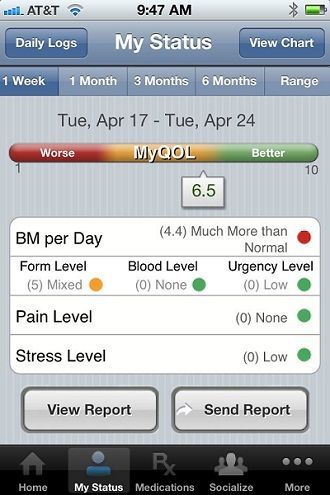
The concept of tracking a group of patients over time with alerts when their trajectory falters is not a new one. Panel management has been practiced in many primary care clinics for years through products like i2i, Phytel, and EMR registry functions. The two most common complaints I hear about these products are that they significantly add to clinic overhead through support staff requirements and changes in clinical workflows, and that the output for most is nothing more than a list of names and bar graphs. Medivo registries do not require maintenance by clinic staff, and their patient engagement product has the potential to decrease many phone calls by directly notifying patients when new labs or office visits are required.
To fully realize this, Medivo will need to build out robust clinic and lab scheduling integrations (the latter is listed as a “coming soon” function on the website). Clinics still in fee-for-service environments are obviously incentivized to prefer that patients physically present themselves for care so they can bill for the interaction. While the question of fee-for-service versus capitated payments in our health system continues to evolve, Medivo is already well poised to serve primary care clinics within integrated systems or those facing patient access issues.
One limitation I see is that existing panel management products offer a wide range of other registries in addition to lab tracking, such as patients due for vaccines or cancer screening, or being monitored on blood thinners. Most clinics and hospitals are loathe to invest in health IT products that solve only slices of their problem, even if the full-service alternatives are inferior in other ways. While the patient engagement piece is compelling for its potential to improve disease management, there is currently no financial incentive for systems to choose Medivo for this purpose (though there is an ongoing campaign to make this part of Meaningful Use requirements).
The entire platform is currently free, a significant differentiator from related products. Medivo’s Bhan (previously CEO and co-founder of Medsite, acquired by WebMD in 2006), says that they plan to initially monetize through advertisements and promotional materials. The lab data itself is not sold.
Given physician quotes on their website, Medivo appears to be actively broadening its product to include labs for other chronic diseases, such as rheumatoid arthritis, Irritable Bowel Disease, and patients on anti-platelet medications.
Price:
Free!
Likes:
Interface beats most if not all other population management systems.
Patient engagement piece is unique and robust.
Potential to address patient symptom tracking workflow integration challenge for providers.
Free! (caveat below)
Dislikes:
Currently focused on diabetic labs, so mostly a point solution.
CEO Bhan states they are rapidly testing and expanding to all major areas of screening, and also symptom tracking for IBD.
Revenue model based on ads and direct promotional advertisements. Given conflict of interest concerns, it’s unclear how larger hospital and clinic systems will respond.
Conclusion:
Medivo must broaden quickly to compete with products that cover more disease categories and clinical data beyond labs.
However, I predict their differentiation in patient engagement and design will make Medivo a winner, especially in primary care and those specialties heavy in chronic disease management.
Click for: WellsApps
Click for: Medivo
Click for: campaign to include patient engagement in MU
